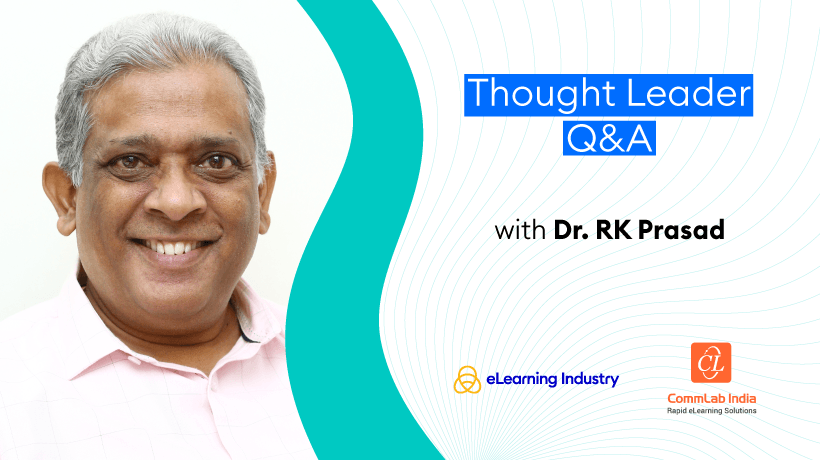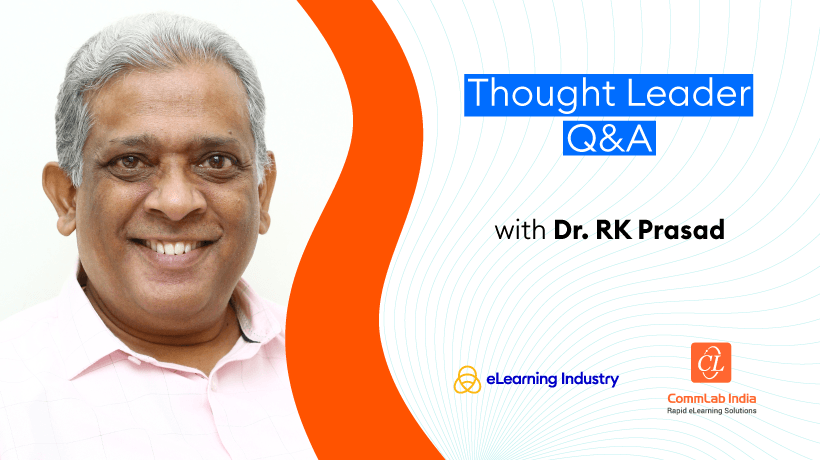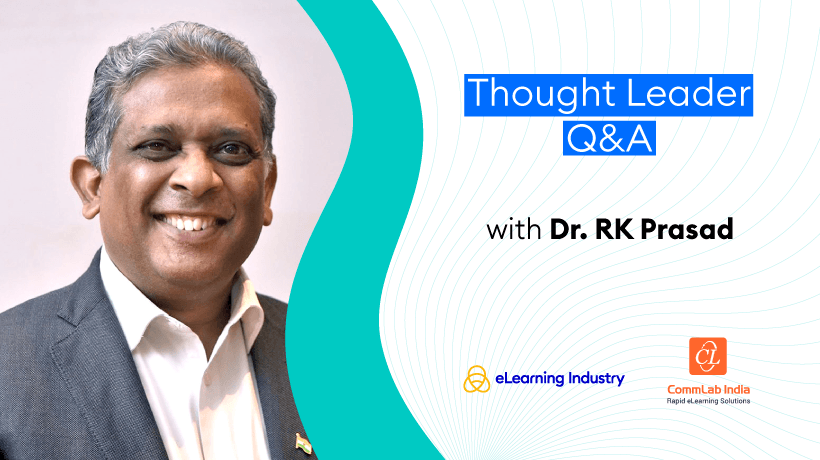Exploring AI's Role In eLearning And ILT's Strategic Comeback
Dr. RK Prasad has decades of experience in corporate training, university teaching, and eLearning. Today, he speaks with us about how AI is bringing the classroom back into vogue, the unreplaceable role of humans, preparing for an L&D future with AI, and more.
There's still some reluctance to adopt AI in the eLearning industry. What would you say to L&D professionals who believe that AI is a human replacement?
Last month, I was speaking with a group of Learning and Development leaders about the future of Instructional Design. One senior manager summed it up in one sentence: "I'm excited by AI's potential and also wondering if I'll have a job in five years." That tension? It's real, and it's growing.
Artificial Intelligence is already reshaping how we create, deliver, and evaluate learning. At first glance, that sounds like a dream come true: faster content development, personalized learning paths, real-time analytics. But scratch the surface, and there's a bigger shift underway, one that challenges our assumptions about what makes an L&D team indispensable.
The question we should be asking isn't whether AI will replace us. It's this: What will still require a distinctly human touch? And how can we protect and amplify it?
Based on your real-world experiences, how is AI impacting the Instructional Design field right now?
The AI tsunami has already hit Instructional Design. Let's not sugar-coat this. Instructional Design, the craft of building effective, engaging learning experiences, is facing automation head-on.
Tools such as ChatGPT, Midjourney, Vyond, Synthesia, and Canva's AI suite now let a single person produce scripts, voiceovers, visuals, and storyboards in a fraction of the time it used to take a team. Adaptive learning engines such as MaxLearn and Docebo are personalizing experiences at scale. Translation tools like Smartcat are reducing turnaround time and cost by over 50%. It's thrilling. But it's also unsettling.
When a junior designer can generate a basic onboarding module in two hours using AI, what happens to the senior designer who used to take two weeks? What happens when internal business units realize they can bypass L&D entirely and still get "good enough" training?
Even worse, what happens when the intellectual property in your training materials—your secret sauce—is absorbed into AI training data or leaked through unsecured platforms?
What are the limitations of AI when it comes to learning content development and delivery?
Despite the power of these tools, AI can't replicate everything. It can't coach someone through a tough conversation. It can't notice that a high-potential leader is withdrawing during a classroom activity. It doesn't feel the hesitation in someone's voice during a role-play.
It doesn't understand the messy, beautiful nuance of human behavior in real time.
This is why I believe Instructor-Led Training (ILT) and live facilitation are going to make a strategic comeback. Not as the default mode, but as the premium tier; the part of the learning strategy reserved for high-stakes transformation, leadership development, and cultural alignment.
Because no AI-generated module, no matter how elegant, can replicate:
- Trust-building between humans
- Cultural sensitivity in a global team context
- The ability to read a room, pivot mid-session, and create a safe space
- Judgment honed through decades of experience
In short, AI is brilliant at content. But transformation happens in context, and context is still human terrain.
How can organizations future-proof themselves and their teams while still embracing the potential of AI?
We hedge. Not by rejecting AI, but by doubling down on what makes us uniquely human. Here's what I think we need to do:
1. Preserve and prioritize live experiences. ILT and classroom-based learning offer a relational depth that digital can't touch. Use AI to automate the "what," and reserve humans for the "why" and "how."
2. Elevate judgment and ethics. Who will decide which behavior counts as "success" in your leadership module? Who ensures bias doesn't creep into your DEI training data? These are not tasks for algorithms. They demand human oversight and ethical reasoning.
3. Build emotional intelligence as a core skill. AI doesn't know how to mediate conflict, coach anxiety, or inspire trust. You do. And that makes you invaluable.
4. Create genuine learning communities. While everyone else automates their LMS to send nudges, you can create internal networks, mentoring circles, and feedback forums where employees learn from one another, not just from content.
5. Protect your intellectual property. Avoid uploading proprietary content into public AI tools. Advocate for secure, enterprise-grade AI systems. Educate your team on the risks of "prompt leakage" and shadow AI use.
Here are five questions to find your human edge. Ask yourself and your team:
- What parts of our L&D work rely on emotional intelligence or live interaction?
- Which stakeholders trust us because of our judgment, not just our output?
- What training moments have we led that could never have worked in an AI-only format?
- Where do we create psychological safety, not just compliance?
- What part of our experience is so context-rich that it would be impossible to simulate or replicate?
These are the fault lines AI can't cross. And they're where our future lies.
What do you think the future holds for AI in learning, particularly regarding the human-AI collaboration?
It's going to be a hybrid future, not a binary one. AI isn't the enemy. Used wisely, it's an incredible ally, but we must be discerning. Use it to scale, simplify, and speed up. But draw a line around the work that defines your humanity.
At CommLab India, we're integrating AI in our translation and rapid development pipelines. But we're also running high-touch leadership labs, feedback-intensive performance coaching, and experiential workshops that AI couldn't lead.
The closing bet is that people will matter more. AI is coming for the repeatable, the scalable, the impersonal. Let it. What it can't touch—not yet, maybe never—is what makes you human:
- Your ability to listen deeply
- Your instinct to protect learners
- Your talent for turning friction into growth
- Your gift for connecting people
The winners of the next decade in L&D won't be the ones who used AI the most. They'll be the ones who knew what not to hand over. So, lean into your humanness. Design with empathy. Facilitate with presence. And teach others to do the same. Because in the end, the smartest tools in the world won't matter if no one trusts the hands that use them.
What role do human qualities still play in Instructional Design?
A thoughtful counterpoint: don't just be human, be exceptional. Let me offer a gentle challenge to everything I just said.
Yes, human qualities such as empathy, judgment, and trust matter. But we should be careful not to romanticize them as permanently safe from disruption. AI is advancing fast, faster than most of us are prepared for. It's learning to mimic emotional nuance, adapt conversations in real time, and even simulate facilitation dynamics. It's already analyzing behaviors, voice inflections, and decision patterns with eerie precision.
So, while we may feel secure in our "human edge" today, that edge is narrowing quickly. Which is why it's not enough to simply be human. We need to be exceptionally human to bring depth, creativity, and originality that AI can't replicate or predict.
That means:
- Building relationships that go beyond polite professionalism
- Designing learning moments that stir reflection, not just recall
- Leading with curiosity, not just competence
- Having the courage to ask, "What do I offer that's truly irreplaceable?"
Because the truth is, AI will soon do good enough in many areas of L&D. If we settle for being good enough too, we lose our lead.
So yes, I still believe human connection will matter more than ever. But only if we raise the bar on what it means to show up as leaders, designers, and facilitators.
Wrapping Up
Many thanks to Dr. RK Prasad for speaking with us and sharing his valuable insights. RK was featured in our eLearning Trailblazers List, and you can read his articles by visiting his author profile on our site, where he covers rapid eLearning development, AI-enabled training, and much more.







